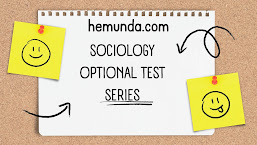Compilation of Questions of Sociological Thinkers
[ For OAS Main Exam]
Subject- Sociology
Topic- Sociological Thinkers[ Chapter-4], Paper-1
Pioneering contributions to Sociology:
a) Karl Marx: Historical materialism, alienation, and class
struggle.
b) Emile Durkheim: Division of labor, social fact,
religion and society, suicide.
c) Max Weber: Social action, ideal types, authority,
bureaucracy, the protestant ethic, and the spirit of capitalism.
d) Talcott Parsons: Social system, pattern variables.
e) Robert K. Merton: Latent and manifest functions,
anomie, conformity and deviance, reference groups.
Past Years’ Questions from this Chapter.
Latent and Manifest functions. [ 2017,2019, 20 marks]
Mechanical and organic solidarity. [2019, 20 marks]
Ideal types. [ 1997,2019, 20 marks]
Write an essay on Weber's typology of authority with examples. [ 2019, 60 marks]
Discuss the materialistic conception of history. [2019, 60 marks]
Reference groups. [2018, 20 marks]
Explain Durkheim’s views on religion and society. [2018, 60 marks]
Alienation; [1996,1997,2017, 20 marks]
Critically discuss Marx’s theory of historical materialism. What does Marx mean by alienation? [2016, 60 marks]
Class in itself and class for itself. [2011,2016, 20 marks]
Suicide is a social fact. Discuss highlighting Durkheim’s perspective as a positivist. [ 2016, 60 marks]
Social fact [ 1992,2015, 20 marks]
Social aspects of the division of labor. [ 2015, 20 marks]
Caste as a class. [ 2015, 20 marks]
Explain Weber’s views on protestant ethics and the spirit of capitalism. [ 2015, 60 marks]
Discuss Emile Durkheim’s views on the division of labor. [2011, 60 marks]
The analytical capability of ‘Verstehen’ in understanding human behavior. [ 2006, 20 marks]
Socio-cultural aspects of Division of labor. [2006, 20 marks]
Examine Marxian view of social change and its relevance to the nature of social development in contemporary Indian society. [ 2006, 60 marks]
Analyze Max Weber’s contribution to understanding the influence of Protestant ethics and the growth of capitalism. [ 2006, 60 marks]
Write a note on Marx’s concept of class. What importance does he assign to class consciousness? [ 2006, 60 marks]
The social fact as an aspect of social conscience. [ 2006, 20 marks]
Critically examine Merton’s contention that anomie is a creation of the social structure. [ 2006, 60 marks]
Bureaucracy [ 2000, 20 marks]
‘The history of all hitherto existing society is the history of class struggle’ Comment. [ 2000, 60 marks]
Authority and legitimacy. [ 1996,2000, 20 marks]
Evaluate the social role of the division of labor in the industrial economy. [ 2000, 60 marks]
Social action. [1997, 20 marks]
Discuss Weber’s view on Protestant ethics and the spirit of capitalism. [ 1997, 60 marks]
Conformity and Deviance. [ 1992,1997, 20 marks]
Division of labor. [ 1997, 20 marks]
Discuss Merton’s contribution to the theory of social change. [1997, 60 marks]
Critically examine the ‘Ideal type’ of Max Weber. [1996, 60 marks]
Class struggle [1996, 20 marks]
Write an essay on ‘Durkheim’s Division of Labour’.[ 1996, 60 marks]
Discuss Merton’s concept of ‘ Anomie’ and examine how it leads to the development of antisocial behavior. [1996, 30 marks]
What is Verstehen? Discuss Weber’s contribution to Social Action. [ 1996, 30 marks]
Discuss Durkheim’s contribution to the ‘Theory of Suicide’. [ 1996, 30 marks]
Gemeinschaft and Gesellschaft. [ 1996, 15 marks]
‘ Protestant ethic paved the way towards the development of capitalism in the western world’. Discuss. [ 1992, 60 marks]
Explain the Marxian theory of Class struggle referring to his contribution on ‘ Historical Materialism’ and ‘ Dialectical Materialism’. [ 1992, 60 marks]
Conformity and social control. [1991, 20 marks]
Discuss the contribution of Durkheim to sociology. How far did his methodology influence sociological traditions? [1991, 60 marks]
What is ‘social action’? Discuss its place in the analytical frameworks of Max Weber and Talcott Parsons. [1991, 60 marks]
What do you mean by functionalism? Explain Merton’s paradigm of functional analysis. [1991, 60 marks]
Define the concepts of ‘status’ and ‘ Role’. State how status and role are interrelated? [ 1991, 60 marks]







































0 Comments
please do not enter any spam link in the comment box.